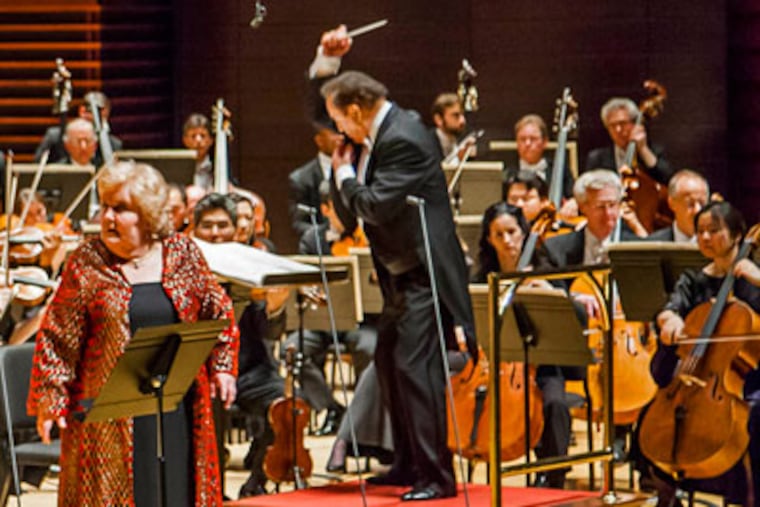Virtuosic “Elektra” from orchestra and singers
In a way, it’s a shame that opera has been consigned to the opera house for so much of its four centuries. The two sides of the form, visual and musical, were of course conceived as a synergistic whole beneath the proscenium. But almost as rebuttal to the Metropolitan Opera’s $16 million Ring cycle and its 45-ton set, the Philadelphia Orchestra put on an Elektra on Thursday night in Verizon Hall that, by omitting costumes and sets, burned a deep hole in the theory that the eye has any legitimate claim on the genre. The orchestra has never before played Richard Strauss’ 1906-08 score, an astonishing fact given the group’s proto-Straussian role, Stokowski’s penchant for shock value, and the ensemble’s golden decade with Strauss specialist Wolfgang Sawallisch.

In a way, it's a shame that opera has been consigned to the opera house for so much of its four centuries. The two sides of the form, visual and musical, were of course conceived as a synergistic whole beneath the proscenium. But almost as rebuttal to the Metropolitan Opera's $16 million Ring cycle and its 45-ton set, the Philadelphia Orchestra put on an Elektra on Thursday night in Verizon Hall that, by omitting costumes and sets, burned a deep hole in the theory that the eye has any legitimate claim on the genre.
The orchestra has never before played Richard Strauss' 1906-08 score, an astonishing fact given the group's proto-Straussian role, Stokowski's penchant for shock value, and the ensemble's golden decade with Strauss specialist Wolfgang Sawallisch.
Strange, too, given the fact that after Elektra herself, this opera belongs to the orchestra.
Just consider: The oboe starts to send Aegisth off to his death even before Elektra does, and contrabassoon and harp — a bizarre, spooky combination — open the door for him. A disturbed piccolo evokes a hut shaking in a storm. Dissonance slithers through the score at the mention of the word sick. As Klytämnestra details her dreams, her thoughts are sprinkled with orchestral moon dust. These connections among text, orchestration, and harmony are so powerful that they have persisted the full century into sound tracks from Citizen Kane to the Harry Potter movies.
Swollen to 117 instrumentalists — and stocked with such exoticisms as bass oboe and Wagner tubas — the orchestra was at its virtuosic best. This is Charles Dutoit's penultimate program as chief conductor — he ends with more theater, Ravel's Daphnis and Chloé (complete), next week. All the strengths of his three-decade rapport were in full view: his instinct for emotional pacing, an ear for when to draw the full power of a string sweep, his shorthand for communicating direction. (Maybe he can command fixes to supertitle glitches in time for Saturday night's repeat.) If there were moments at the start when orchestra overpowered singers, they were brief, and adjustments were made.
Eva Johansson as Elektra — insane but teller of a truth, like the stacked "Elektra chord" Strauss devised for her — endured the taxing hour-and-50-minute part with her voice intact. More than that, she achieved ample edge and remarkably subtle tone shadings, qualities that are difficult to put across even with Strauss' sensitive orchestral accommodations. She could pick out a note pitch-perfect and, devoid of vibrato, hold it, and, through sculpting and coloring, set it aglow with emotion. Jane Henschel's mezzo, extremely powerful and communicative, was the rarest of pleasures. Here is a singer for whom all musical decision flows from the text — with a low range that seems to come with its own resonance chamber.
A dozen other singers deserve mention as authors of distinctly individualized sounds and interesting characterizations, including a couple of the many maids and attendants, as well as Melanie Diener (Chrysothemis), Ain Anger (Orest), and Siegfried Jerusalem (Aegisth). The lure of costumes and sets might hold sway as an idea today. But really, with orchestra and voices like this on stage, how could they ever compete?
Additional performance: 8 p.m. Saturday in Verizon Hall, Broad and Spruce Streets. Tickets: $10-$124. Information: 215-893-1999, www.philorch.org.
Contact Peter Dobrin at 215-854-5611 or pdobrin@phillynews.com. Read his blog at www.philly.com/philly/blogs/artswatch.